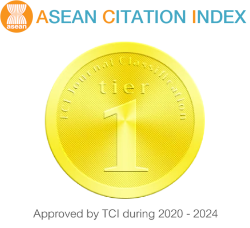Thailand’s Global Movement on Mental Health
Keywords:
global health, mental health, World Health Organization, COVID-19Abstract
In the situation of the COVID-19 pandemic, people were stressful due to the impact on social, economic and health situation from the pandemic. As a result, the number of people with mental health problems and the burden of mental health problems has been increasing. Recognizing the importance of mental health issues during the COVID-19 pandemic, Thailand proposed a mental health preparedness and response for the COVID-19 pandemic as the agenda of the 148th session of the World Health Organization Executive Board and played a leading role in developing a decision on this issue with supports by many countries. Thailand’s movement on mental health was the result of close collaboration between different organizations, continuous investment on capacity building of potential global health personnel and a strong network with countries and the WHO. Therefore, what Thailand has gained from driving mental health issue on the global platform is building a positive role and image of Thailand, incorporating Thailand’s interest into a decision and adapting lessons from other countries on mental health into Thai context.
References
World Health Organization. Mental health: strengthening our response [internet]. 2021 [updated 2022 Jun 17; cited 2021 May 20]. Available from: https://www.who.int/news-room/fact-sheets/detail/mental-health-strengthening-our-response.
World Health Organization. Mental health preparedness and response for the COVID-19 pandemic (EB148/20) [internet]. 2021 Jan 8 [cited 2021 May 20]. Available from: https://apps.who.int/gb/ebwha/pdf_files/EB148/B148_20-en.pdf.
United Nations Children’s Fund. COVID-19 pandemic continues to drive poor mental health among children and young people [internet]. 2021 Oct 8 [cited 2021 Oct 10]. Available from: https://www.unicef.org/thailand/press-releases/covid-19-pandemic-continues-drive-poor-mental-health-among-children-and-young-people.
Javed B, Sarwer A, Soto EB, Mashwani ZR. The coronavirus (COVID-19) pandemic’s impact on mental health. Int J Health Plann Manage 2020 Sep;35(5):993–6.
World Health Organization. COVID-19 disrupting mental health services in most countries, WHO survey [internet]. 2020 Oct 5 [cited 2021 Feb 5]. Available from: https://www.who.int/news/item/05-10-2020-covid-19-disrupting-mental-health-services-in-most-countries-who-survey.
Kuzman MR, Curkovic M, Wasserman D. Principles of mental health care during the COVID-19 pandemic. European Psychiatry. Cambridge University Press 2020;63(1):e45.
World Health Organization. Governance [internet]. 2001 [cited 2021 Apr 17]. Available from: https://www.who.int/about/governance.
Department of Mental Health. Combat 4th Wave of COVID-19 Plan (revised version). Nonthaburi: Department of Mental Health; 2020 May.
World Health Organization. Methods of work of the Executive Board (EB121.R1). Resolution. [internet]. 2007 May 24 [cited 2021 May 20]. Available from: https://apps.who.int/iris/bitstream/handle/10665/22974/B121_R1-en.pdf;jsession-id=AC987BA7EDA2AE5E79553987A4FFAA39?sequence=1.
World Health Organization. Note for the record, Meeting of the Director-General with the Officers of the Executive Board [internet]. 2020 Sep 16 [cited 2021 Apr17]. Available from: https://apps.who.int/gb/gov/assets/NFR_16-09-2020_en.pdf.
Downloads
Published
How to Cite
Issue
Section
License
Copyright (c) 2025 Journal of Health Systems Research

This work is licensed under a Creative Commons Attribution-NonCommercial-NoDerivatives 4.0 International License.
Journal of Health Systems Research is licensed under a Creative Commons Attribution-NonCommercial-NoDerivatives 4.0 International (CC BY-NC-ND 4.0) license, unless otherwise stated.




